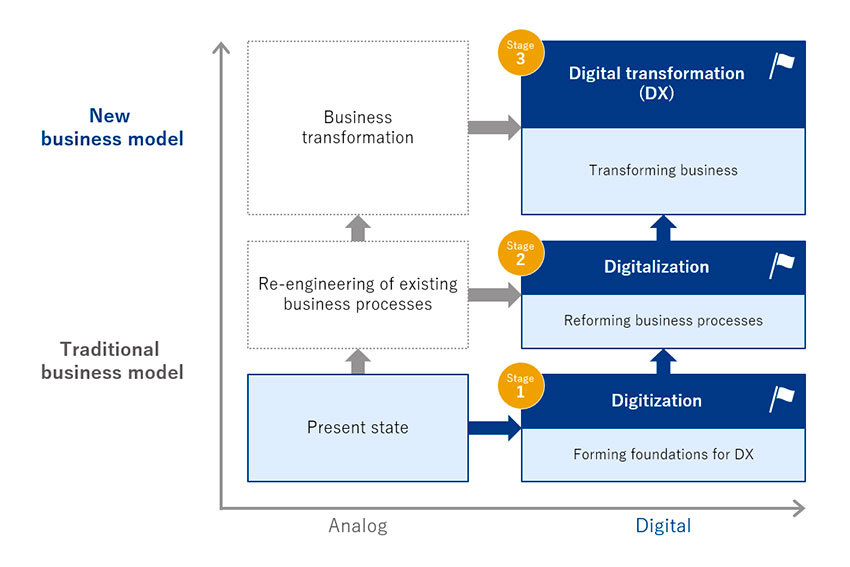Through its Value Creation Process, Mitsubishi Research Institute (MRI) works alongside public and private actors in designing far-reaching solutions to global challenges.

Of all the theories advanced to account for Japan’s reluctance to embrace digitalization, perhaps the most persuasive is that the country’s analogue systems were so efficient that it had no need to go digital. Covid has changed all that, however, and a concerted effort is now underway to bridge the gap between the physical and digital worlds.
Enter the Mitsubishi Research Institute (MRI), a Japanese think-tank of more than 50 years standing, which, thanks to its innovative business model, finds itself perfectly placed to meet the challenges presented by factors such as the country’s aging population and low birth rate.
According to President Kenji Yabuta, MRI provides two core solutions to these issues: “The first is optimizing human resources to enhance productivity; the second is improving wellbeing through initiatives in the healthcare sector based on our unique value creation process (VCP).”
While maintaining its consulting work in the public sector, which remains at the core of its business, MRI is extending its range of activities to offer the same to the private sector, and to further take on the real-world applications of the solutions it proposes. For example, in the field of digital transformation, Mr. Yabuta describes how MRI helps companies evolve as the “DX journey”. The process of transformation itself is “an adventure”, with MRI lending a hand in both charting the way forward and guiding companies along the way.
A shared spirit of action across the company led to the creation of its Value Creation Process (VCP), a singular model that enables MRI to provide consultation research and policy-making advice, which it can then help implement in the real world. Mr. Yabuta adds: “We launched our VCP Management program to facilitate the efficient flow of this process from upstream to downstream. Our upstream work consists in recommending policies to attain the most ideal solutions. Downstream, we implement solutions ourselves in collaboration with business partners or by supporting other businesses to do so.”
In practice this process serves to create synergies between the public and private sectors, building solid networks which foster collaboration and mutual growth. A striking example of this is in the field of renewable energies, an area of increasing importance as Japan moves towards carbon neutrality. Focusing on electricity-trading specifically, MRI identified a gap in the Japanese market and began working in tandem with Dutch-based KYOS Energy Consulting with the aim of leading the emerging market in Japan.

VCP diagram
The partnership shows how research and consultation (upstream) can lead to real-world application (downstream). As Mr. Yabuta states, “MRI forecasts the kind of work that will be required by our society 30 years from now”, harnessing their research to “enhance people’s quality of life".
Looking to the future and alongside existing opportunities in the energy and healthcare sectors, the company is turning its focus to Wellbeing. “The idea,” Mr. Yabuta says, is “to enable more people to live more active lifestyles.” Accordingly, MRI has created a structure within the local community involving the transportation and infrastructure sectors: the Region Ring service, a regional digital currency geared towards supporting active lifestyles.
Outside of Japan, MRI is also looking to expand its international network, with offices recently established in Hanoi for Southeast Asia and Dubai for the Middle East. The purpose, according to Mr. Yabuta, is twofold: “to create a network with the governments and Japanese companies in those regions, and to address various societal issues that these regions will face.” Underlying this dual purpose, of course, is the knowledge that having experienced many of these problems itself, Japan is in an excellent position to share its expertise with the rest of the world.
Meanwhile, as evidenced by their recent collaboration with KYOS, MRI is also clear on the importance of European and North American countries in addressing issues such as carbon neutrality and digital transformation. Helping Western startups establish their business in Japan and provide their services to the country’s population will, in time, mean the introduction of cutting-edge technologies and new innovations. Most recently, MRI began working in the field of data analytics with OVHcloud, Europe’s largest cloud-service provider, to accelerate digital transformation in APAC markets.
Addressing prospective future partners about the unique opportunity that working with MRI provides, Mr. Yabuta says: “We at Mitsubishi Research Institute address various societal challenges and have advanced technical expertise. We are committed to accelerating and improving the digitalization of Japanese society, and would like to work together with companies that are interested in expanding their businesses in these fields within Japan, Southeast Asia and the Middle East.”
0 COMMENTS